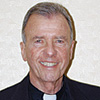Eighth in a series
ONE OF MY favorite insights among the many that I have received from personalist philosophers is their reflection on how person is a “we” term. What I am referring to is the view that the way I relate to myself influences how I relate to others, and the way I relate to others influences how I relate to myself. The way I express this to my students at St. John’s University is by saying something like the following:

